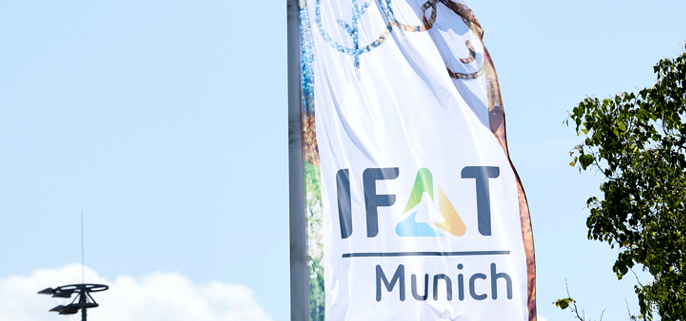IFAT Munich 2024
Municipalities are among the most important users of the products and processes presented at the IFAT Munich 2024 environmental technology trade fair.
From May 13 to 17, 2024, IFAT Munich will bring the global environmental technology industry together again in one place, the organizers announced. The exhibitors at the Munich exhibition center would then once again present their latest products, processes and services from the fields of water and wastewater, waste and raw materials management to the specialist audience. “For many of them, cities and municipalities, with their wide range of environmentally relevant tasks, are part of their key customer base.”
Day of resilient municipalities
Heavy rain and flooding, extreme heat and water shortage – the consequences of climate change cannot be ignored. That results in growing pressure on all social players, such as politicians, companies, and private individuals, to adapt to the changed conditions. Municipalities play a special role on the path to more climate resilience. IFAT Munich is devoting the “Day of Resilient Municipalities”, taking place on Thursday, May 16, to this key role. In collaboration with the German Technical and Scientific Association for Gas and Water (DVGW), the German Association for Water Management (DWA), and the Association of Municipal Enterprises (VKU), lectures, expert panels, and guided tours providing stimulus and insights will be offered for all representatives of the municipal sector.
Digitalization and protection of critical infrastructure
As with society as a whole, cities and municipalities are, of course, also called upon to address the opportunities and risks of the megatrend of digitalization. The VKU, for example, is organizing a panel discussion on the forum stage entitled “AI: Detection systems and reusable materials scanners—how much AI does the waste industry need?” It will examine the question of whether AI is suitable for minimizing resource consumption and improving the quality of the individual categories of waste collected in the interests of a functioning circular economy. The public utility and waste disposal industry are also a critical infrastructure (KRITIS). “The physical and virtual threat has been growing here for years. It is essential to protect these services,” VKU Vice President Patrick Hasenkamp was quoted. On the forum stage, the association will show which legal obligations KRITIS operators must already fulfill now and, more importantly, in the future.
The VKU solution tour “Waste Logistics 2035” also takes a look into the future. “Waste logistics will play a decisive role in resource management by minimizing waste, preserving valuable resources, and hence reducing the environmental impact,” Hasenkamp is convinced.
Clean drives for municipal vehicles
According to Burkard Oppmann, President of the German Municipal Vehicles and Equipment Industry Association (VAK), regarding municipal vehicles and equipment, the use of alternative drive systems, especially hydrogen and battery solutions, and the development of the required charging infrastructure are still key issues. The VAK will be holding a 45-minute panel discussion with industry experts on these and other topics on each day of IFAT Munich 2024. As reported, the discussion will deal, among other things, with an emission-free municipal vehicle industry and municipal economy, the promotion of CO2-free waste disposal, and professional driver qualifications.
The future topic of hydrogen
What role can hydrogen play in the municipal circular economy? A Spotlight Area is dedicated to this question. According to the organizers, the DVGW and the Zentrum Wasserstoff.Bayern (H2.B), will show that there are interesting starting points both in the production and use of this energy source and its by-products. “For example, the energy generated in waste-to-energy and biogas plants can be used for carbon-neutral hydrogen production. In addition to hydrogen, the electrolysis of water also produces oxygen, which can be used to effectively aerate clarifiers. Methane from sewage sludge treatment or also plastic waste can be processed into hydrogen and carbon that can be used in agriculture or industry. And the fact that the first waste collection vehicles are already running on hydrogen has already been mentioned above.”
(Published in GLOBAL RECYCLING Magazine 1/2024, Page 34, Photo: Messe München GmbH)





